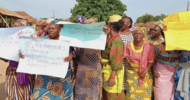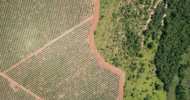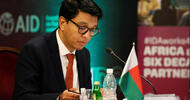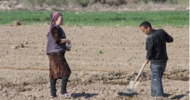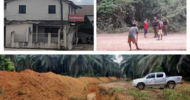This article calls into question the depth and effectiveness of a regulatory approach arguing that problems underlying large-scale land deals are so deep constituting socio-institutional problems of power asymmetry, exclusion and invisiblization, than just investment externalities or regulatory challenges.
The Ministry of Agriculture is working on a draft bill for the formation of an autonomous federal agency, which would administer land available for agricultural investment in Ethiopia.
- Addis Fortune
-
30 December 2012
According to the data presented by international non-profit Rights and Resource Initiative, Indian companies have acquired 63,000 sq km land, an area almost twice the size of Kerala, in Africa, South America and Southeast Asia.
- Down to Earth
-
29 December 2012
"Large scale agriculture investment requires a lot of transparency and legal certainty, and that is what is lacking most of the time," he says. "We have seen that large-scale investment coming - I'm not saying that it is wrong, but it should be very clearly covered by countries' legislation.
- This is Africa
-
20 December 2012
This piece is part of "Water Grabbers: A Global Rush on Freshwater", a special National Geographic News series on how grabbing land—and water—from poor people, desperate governments, and future generations threatens global food security, environmental sustainability, and local cultures.
- National Geographic
-
14 December 2012
Mercy Corps, a non-governmental aid agency, plans to set up a $10 million private equity fund in Ethiopia to encourage foreign investment, primarily in agriculture.
- Bloomberg
-
11 December 2012
Controversial farmland deals in developing countries can have a negative impact on the people who live on the land, according to a new U.N. report.
As losses from Karuturi's Ethiopian farm operations mount, over 3,000 workers from the company's flower farm in Kenya down their tools to protest non-payment of their salaries and poor working conditions.
- The Star
-
05 December 2012
Major farmland investors such as banks and pension funds must stop facilitating land grabs, civil society groups on the eve of a global farmland investment conference in London on December 3-5, have said.
- AkanimoReports
-
30 November 2012
Olam's rebuttal provides new information on its rice farming operations in Nigeria, including its cooperation with the Africa Rice Centre of the CGIAR.
Agco Corp. (AGCO), the world’s third- largest farm-equipment maker, plans to invest $100 million in Africa over the next three years to capitalize on an agricultural boom and a shift to commercial farming.
- Bloomberg
-
16 November 2012
A new study puts "land-grab" deals into the context of agricultural investments more generally.
Former Nigerian president Obasanjo calls on African Union to develop a framework for managing foreign investment in agriculture, and says governments should consider a moratorium on large-scale land deals pending legislation to protect smallholder farmers.
Indian companies which invested in controversial deals involving hundreds of thousands of acres of land in Ethiopia have found themselves out of their depth in a fast-growing African economy.
- The Hindu
-
26 October 2012
ROPPA, Actionaid, Oxfam and EAFF have urged Nigerian and other African leaders to guarantee transparency in the management of large-scale land transactions and freeze acquisitions which do not conform to rules, regulations and the framework of the land declaration of the African Heads of States and Government of 2009.
Only legal recognition of commons as the communal property of communities is sufficient to afford real protection, writes Liz Alden Wily
- Wealth of the Commons
-
23 October 2012
The company plans to expand its acreage in Laos to 5,000 hectares, grow arabica in Medan, Indonesia, and acquire existing plantations in Brazil, while clearing of land has begun on the 5,000 hectares Olam has leased in Ethiopia.
- Today Online
-
17 October 2012
India is one of Africa’s biggest investors in agricultural land.
A slide show by GRAIN that profiles some of those who have been most actively pursuing or supporting farmland grabs around the world.
This paper examines the incidence of large-scale purchase of agricultural land in Africa by Indian investors.
- Consultancy Africa
-
16 October 2012
Researchers find that bulk of deals to lease out land are struck in 32 of the countries ranked “alarming” or “serious” on the Global Hunger Index score.
It is important to unpack what land grabbing really involves if we are to understand what is really happening.
Large-scale agricultural in the developing world have received significant attention in recent months and years. This articles looks at the dynamics of the Ethiopian context and policy recommendations in moving forward.
- Logan Cochrane
-
01 October 2012
African agriculture has a big investment problem: lots of private equity interest but few opportunities because most farms and companies are too small to absorb the cash or provide attractive returns.
- Reuters
-
29 September 2012
Ethiopia announced on Friday plans to lease 100,000 hectares of land both to local and foreign investors, despite recent reports that foreign investors were grabbing large chunks of land.
- The Africa Report
-
28 September 2012
The Liberian government has leased nearly 6 per cent of Liberia’s total land mass to palm-oil companies. More than a million people live on those lands, and 150,000 will be affected in the first five years of the plantations.
- Globe and Mail
-
27 September 2012
We are witnessing a second scramble for Africa and other poor countries by rich nations and agribusinesses to acquire land for agricultural and biofuel purposes.
- Centre LSD
-
27 September 2012
Ethiopia Sugar Corp. said it’s signed agreements with state-owned China Development Bank Corp. for $500 million in loans to build two refineries, part of a plan to boost output of the sweetener almost tenfold by 2025.
- Bloomberg
-
26 September 2012
BHO Bioproducts, a closely held farming company, said it plans to invest more than $120 million in rice and cotton production on 25,000 ha in Ethiopia’s western Gambella region during the next four years.
- Bloomberg
-
25 September 2012
Anuak indigenous people from Ethiopia’s Gambella region submitted a complaint today to the World Bank Inspection Panel implicating the Bank in grave human rights abuses perpetrated by the Ethiopian Government.







